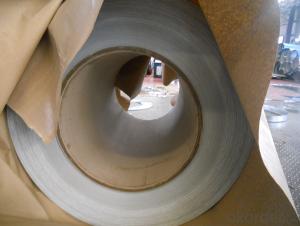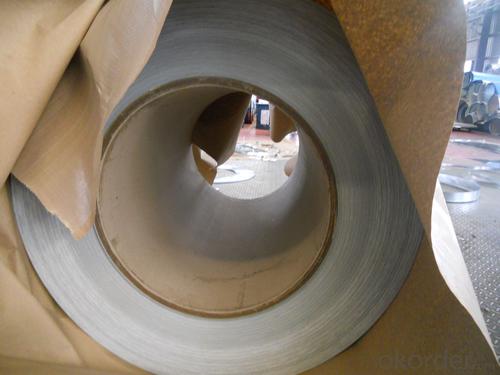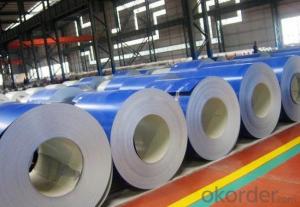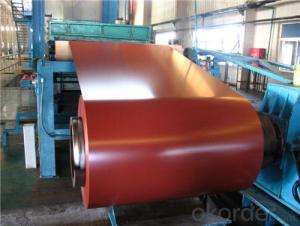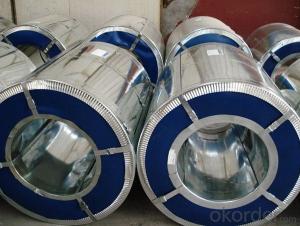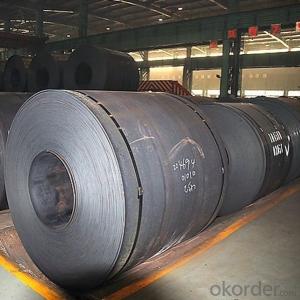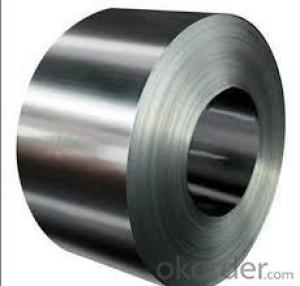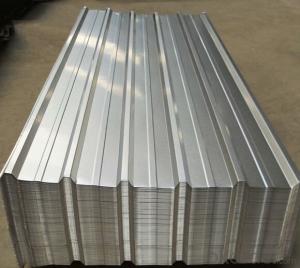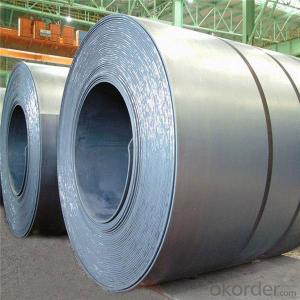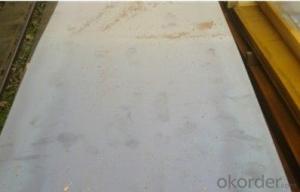STEEL COIL
- Loading Port:
- China Main Port
- Payment Terms:
- TT OR LC
- Min Order Qty:
- -
- Supply Capability:
- -
OKorder Service Pledge
OKorder Financial Service
You Might Also Like
| | |
Galvanized Steel Coil gets coated in layers of zinc because rust won't attack this protective metal. The most external layer is all zinc, but successive layers are a mixture of zinc and iron, with an interior of pure steel. These multiple layers are responsible for the amazing property of the metal to withstand corrosion-inducing circumstances. Zinc also protects the steel by acting as a "sacrificial layer." If rust does take hold on the surface of Galvanized Steel Coil, the zinc will get corroded first. This allows the zinc that is spread over the breach or scratch to prevent rust from reaching the steel. For countless outdoor, marine, or industrial applications, Galvanized Steel Coil is an essential fabrication component.
HOT DIP GALVANIZED STEEL COIL
STEEL GRADE & STANDARD:JIS G3302 SGCC
ZINC COATING MASS:Z09
SPANGLE:REGULAR SPANGLE
SURFACE TREATMENT:CHROMATED,UNOILED,NONSKINPASSED
THICKNESS:1.20MM
WIDTH:1220MM
COIL ID:508MM
COIL WEIGHT:4-7MT
WIDTH TOLERANCE:0/+5MM
- Q: Help me compare the speed of sound in air, water, and steel please?Thanks.
- Sound Speed In Water
- Q: I recently got in a car accident with a steel mailbox, on a snowy day. I was wondering if i can do anything since the steel mailbox caused my car to be totaled. Otherwise it would have been fine and would have suffered only minor damage. Anything I can do here to maybe get some money back? Thanks!
- That's exactly what happened last winter where I worked. The driver's insurance (it was a late model SUV) paid for the damage to the vehicle and to our mailbox. The 4 inch steel post really bent the SUV.
- Q: What is the lifespan of coated steel coils?
- The lifespan of coated steel coils can vary depending on various factors such as the quality of the coating, the environment in which they are used, and the maintenance practices followed. However, with proper care and maintenance, coated steel coils can last for several decades.
- Q: How are steel coils used in the production of pipelines?
- The production of pipelines relies heavily on steel coils, which are indispensable components. These coils, crafted from top-notch steel, are utilized in the manufacturing of the pipes themselves. To initiate the process, the steel coil is unfurled and then cut into the desired size and length. The resulting pieces are then molded into cylindrical tubes through a technique known as pipe forming. Once the pipes are formed, they undergo several additional procedures to bolster their strength and durability. These may include welding, heat treatment, and coating to safeguard against corrosion. Steel coils are also employed in the creation of essential fittings and connectors required for the connection and joining of the pipes. The utilization of steel coils in pipeline production offers numerous advantages. Firstly, steel possesses exceptional strength and durability, rendering it ideal for withstanding the high pressure and stress that pipelines endure. Additionally, steel exhibits remarkable resistance to corrosion, a critical characteristic for pipelines that transport various substances like oil, gas, or water. Moreover, steel coils facilitate efficient production processes. The uniformity of the coils ensures consistent pipe dimensions, thereby facilitating easy assembly and installation. The versatility of steel allows manufacturers to customize pipes of varying sizes and specifications to meet specific project requirements. In conclusion, steel coils assume a crucial role in pipeline production. They are utilized in the creation of pipes, fittings, and connectors. The utilization of steel guarantees strength, durability, and resistance to corrosion, making it the preferred material for pipelines. Furthermore, steel coils enable efficient production processes and offer versatility in terms of customization.
- Q: What are the different grades of steel used in coil manufacturing?
- There are various grades of steel used in coil manufacturing, including low carbon steel, medium carbon steel, high carbon steel, stainless steel, and alloy steel. These grades differ in their composition, strength, and corrosion resistance, allowing manufacturers to choose the most suitable grade for specific applications and requirements.
- Q: How are steel coils used in the manufacturing of automotive springs?
- Steel coils are used in the manufacturing of automotive springs as they provide strength, durability, and flexibility required for suspension systems. The steel coils are shaped and formed into the desired spring shape, ensuring optimal performance and handling of the vehicle.
- Q: What are the advantages of using steel coils?
- There are several advantages of using steel coils. Firstly, steel coils are highly durable and have a longer lifespan compared to other materials, making them ideal for long-term use. Additionally, steel coils have excellent strength-to-weight ratio, allowing them to withstand heavy loads without compromising structural integrity. They also provide superior resistance to corrosion, making them suitable for various environments, including high humidity or coastal areas. Furthermore, steel coils can be easily recycled, making them an environmentally friendly choice. Overall, the advantages of using steel coils include durability, strength, corrosion resistance, and sustainability.
- Q: I'm in the middle of a remodel and buying appliances. Is there any way to ensure that the stainless steel is the same tone if you get different brands?
- it doesn't really matter. I have all appliances in my kitchen stainless steel. All different makes never noticed the tone, I think it just depends on the grain. i clean my appliances side to side not up and down. Good question never thought about that.
- Q: Cooling bed generally a part of the steel rolling mills
- In the USA, a steel cooling bed is called a run-out table. It consists of a series of steel rolls. Each roll may be individually driven by an electric motor. DC motors are often used with parallel armatures connected to a common armature voltage control speed control unit. The roll speed is controlled to match the speed of the incoming sheet of steel so that the steel does not slide or skid on the surface of the rolls. Field trim resistors help to assure that the speed and torque of rolls is matched. A centering mechanism may be used to keep the steel in the center of the table. Water may be sprayed from the top and bottom to aid cooling. After an initial run out table, the strip of steel may be cut on-the-fly into individual sheets which pass to another table that is running slightly faster to separate the sheets. Alternatively, the steel may be coiled at the end of the table.
- Q: How are steel coils used in the manufacturing of railway equipment?
- The strength, durability, and versatility of steel coils are crucial factors in their importance in the manufacturing of railway equipment. These coils, typically made from high-quality steel, are extensively used in various applications throughout the railway industry. A primary application of steel coils in the manufacturing of railway equipment is the production of train tracks. By rolling and shaping steel coils into long, continuous rails, the foundation of railway tracks is formed. This allows the tracks to withstand heavy loads, constant train traffic, and harsh weather conditions, thanks to the coils' strength and durability. Moreover, the uniformity and consistency of steel coils ensure smooth and safe train operations. Additionally, steel coils are utilized in the manufacturing of railway wagons and carriages. These coils are shaped into various components, such as the framework, body panels, and structural supports of the wagons. The robustness of steel coils guarantees the structural integrity of the wagons, enabling them to carry heavy cargo and endure the hardships of railway transportation. Furthermore, steel coils find use in the fabrication of various railway equipment accessories, including couplings, brake systems, and suspension components. These coils are shaped and sized precisely to meet the specific requirements of each accessory. The strength and resilience of steel coils make them ideal for these critical parts, ensuring the efficient and safe operation of railway equipment. In conclusion, the role of steel coils in the manufacturing of railway equipment is vital. Their strength, durability, and versatility make them an essential material for constructing train tracks, wagons, carriages, and various accessories. The use of steel coils guarantees the safety, reliability, and longevity of railway equipment, making them an integral part of the railway industry.
Send your message to us
STEEL COIL
- Loading Port:
- China Main Port
- Payment Terms:
- TT OR LC
- Min Order Qty:
- -
- Supply Capability:
- -
OKorder Service Pledge
OKorder Financial Service
Similar products
Hot products
Hot Searches
Related keywords
